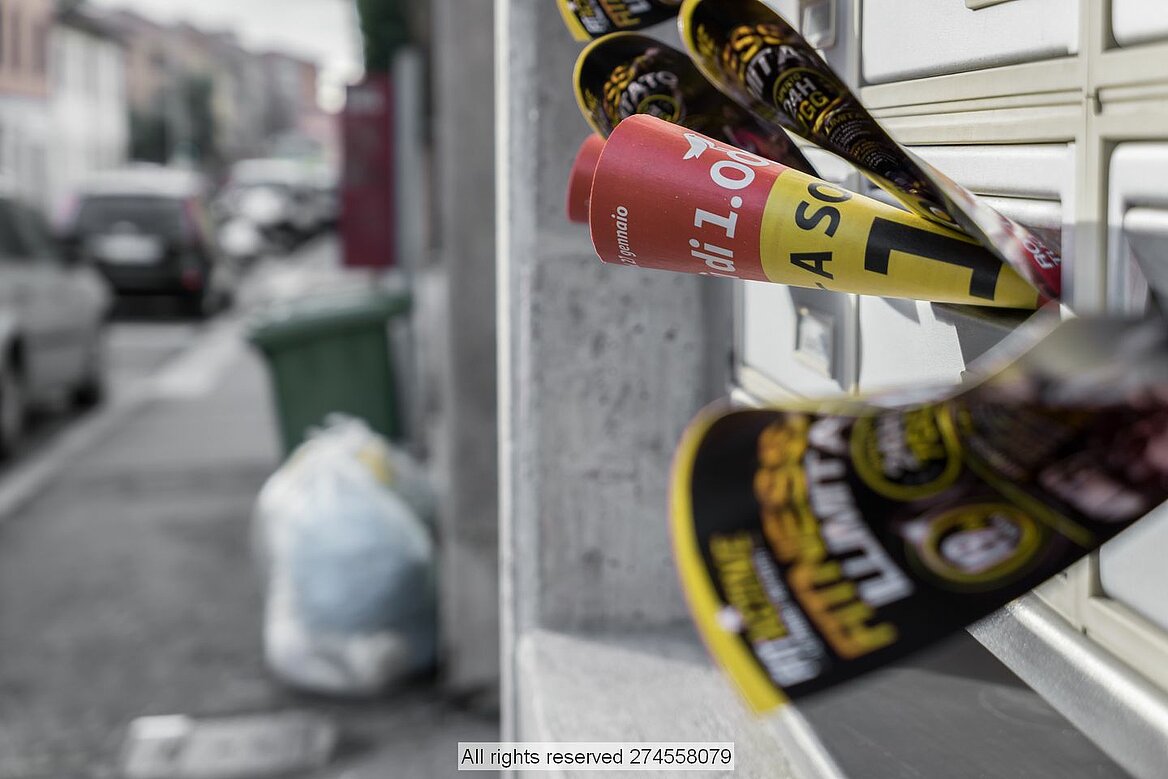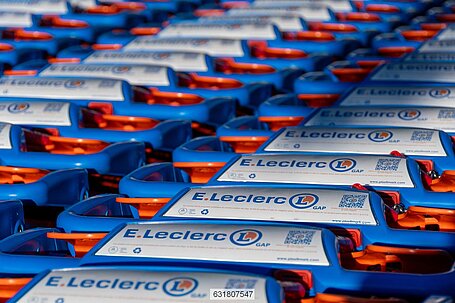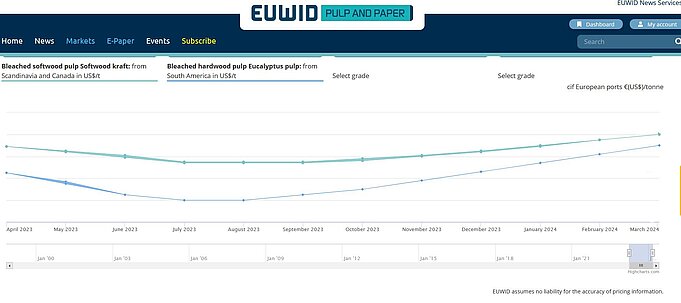
In May, Luxembourg became the first European country to adopt new waste legislation banning the postage and distribution of commercial printed advertising materials without the recipient's express consent. EUWID asked a variety of associations and bodies about whether Luxembourg might become a model for other European countries with these opt-in rules, the status of the discussion in Germany and the environmental benefits and economic consequences of this move.
By revising its waste legislation, the Grand Duchy of Luxembourg has committed itself to the cause of reducing waste arisings. Under the new rules, sending unaddressed postal advertising and informational mailings will only be permitted if the recipient has given their explicit consent, for instance, by putting a sticker to this effect on their letterbox, starting in 2024. The move affects commercial advertising, including supermarket and retail chain flyers, menus, and other pamphlets offering different services. Anybody infringing these provisions ran the risk of fines of up to €10,000, according to the wording of the law. Newspapers and magazines, even those containing advertising, are explicitly excluded from the scope of the rules.
Industry associations in Luxembourg and other European countries disparaged this decision. For instance, the Luxembourg printers group Association des Maitres Imprimeurs (AMIL) criticised the law as "serious interference in the free movement of goods in the advertising sector." In particular, the industry association lamented the lack of dialogue between the government and market players affected by this law. AMIL warned that this action might put 200 jobs at risk in the printing industry, which had already been hit hard by crises in recent years.
And in actual fact, the first repercussions are already visible today – 18 months before the legislation actually takes effect. At least one company in Luxembourg has said that it will cease operations because of the ban: the publisher Mediahuis Luxembourg plans to shut its printing plant by the first quarter of 2024 at the latest. In particular, this decision had been made in response to the adoption of the new waste legislation, the firm said.
"All other arguments, such as stigmatising people who want to receive this advertising and excluding small companies reliant on this type of advertising, are simply dismissed," the association added. AMIL also points out that the legislation might contravene EU rules on the free movement of goods – so it would not be in compliance with EU rules.
Criticism from German quarters too
Any decision by the German Federal Government to enact a similar ban on advertising magazines and all kinds of printed advertising would come as a heavy blow for publishers and printers. Therefore, German industry associations representing printers and advertisers like BVDM (Bundesverband Druck und Medien), BVDA (Bundesverband Deutscher Anzeigenblätter) and ZAW (Zentralverband der deutschen Werbewirtschaft) expressed their regret and confusion about Luxembourg's decision.
Lena Peltzer from the BVDA described the move as a step towards a climate hostile to advertising that particularly affects local brick and mortar shops in Luxembourg. A shift to online advertising activity could not replace printed communications about the products and services offered by local companies. This step would clearly benefit online giants and further strengthen their market power, the BVDA spokesperson added.
Yet, the associations do not believe that developments in Luxembourg raise the need to take action in Germany. "At any rate, the new legal situation in Luxembourg cannot be viewed as trailblazing or anything of that kind," Anne Grote from the association ZAW told EUWID. As a small country, Luxembourg is a special case that cannot easily be replicated, according to the BVDA. There were significant structural differences between Germany and Luxembourg, noted Julia Rohmann, the BVDM's consultant on environmental protection and occupational safety issues.
Unlike the Grand Duchy, which has a unique urban environment, Germany was home to consumers – especially in rural areas – who were still very interested in the information that they received through household advertising, the associations noted. This was also reflected in the fact that just 28.5 per cent of people did not want to receive postal advertising in 2021 (percentage of households with a 'no advertising' label). Representative surveys regularly found that about 60 per cent of consumers consistently use postal advertising and informational mailings as a relevant source of information when planning their purchases. These door drops were a key source of information for people 60 and older and less internet-savvy consumers, in particular, the associations said. At the same time, no other form of advertising providing such universal, targeted and low-cost contact with regional consumer groups was conceivable for merchants, especially local retailers, they added.
In the view of the BVDA, an opt-in for unaddressed postal advertising in Germany would also harm free weekly newspapers. A move of this kind would have negative repercussions where joint distribution structures were in place and could cause uncertainty among retailers about leaflets. Leaflet inserts account for almost 50 per cent of free weekly newspapers' advertising revenues, according to the BVDA.
Therefore, the ZAW believes that "switching to an opt-in model is not appropriate given the situation facing the German market from the perspective of consumers, companies and the environment." This view was echoed by other industry associations contacted by EUWID.
DUH backs German rules modelled after Luxembourg's approach
Germany has witnessed very similar efforts to those afoot in Luxembourg over the past few years. For years now, the association Letzte Werbung and Environmental Action Germany (DUH) have been lobbying, including with petitions, to introduce rules requiring that unaddressed letterbox advertising could only be delivered at consumers' explicit request. Letzte Werbung and DUH wamt to reverse the current opt-out principle. Letzte Werbung also advocated the introduction of an environmental duty of at least €0.20 on every piece of printed advertising put in letterboxes as door drops, which would be paid by retailers as the companies ordering these leaflets.
In light of this situation, Thomas Fischer, the DUH's circular economy director, described the revised legislation enacted by Germany's small neighbour as "a role model." "Tthe implementation of these rules in Luxembourg spurs on debate not only in Germany but also in other EU member states," he said. In Germany, however, retailers were among those "stonewalling," he added. A recent DUH survey of big German retailers found that they wanted to keep using postal advertising as a key marketing tool. An estimated 28 billion printed advertising leaflets are sent in Germany each year, using more than 1 million t of paper. Until now, just a few companies like Woolworth and KIK were not using door drop, the association said.
Political solutions were therefore needed, Mr Fischer urged, adding "now that the internal restructuring of the German Environment Ministry has been completed, it's time to roll up sleeves and solve the problem of unwanted postal advertising."
Legal hurdles are not the only thing in the way of similar rules in Germany
Indeed, the Alliance 90/The Greens party spotlighted this issue at the last German elections. In its election manifesto, the party called for "unwanted advertising, which is often even packaged in plastic film," to be kept out of letterboxes. "Our goal is for unsolicited advertising only to be received by people who are interested in it," noted Germany's Foreign Minister Annalena Baerbock before the election. Different options, from raising awareness of the current legal situation to the general public to an opt-in model like the one used in Amsterdam, were to be reviewed and discussed in partnership with affected environmental and consumer protection groups.
This issue was ultimately not incorporated into last year's coalition agreement between German political parties. The associations contacted by EUWID did not know of any draft legislation to this effect – neither on avoiding "unwanted" advertising nor on "opt-in stickers."
In any case, implementing such provisions would not be straightforward from a legal perspective. Marie-Christine Fuchs, the spokesperson for the German Federal Ministry of Justice, told EUWID that opt-in rules might impinge on the freedom of advertising guaranteed in the German constitution under Article 5 (1) I and Article 12 (1) of the Basic Law. "In the case of weekly newspapers with editorial content, there are also questions about interference in the freedom of the press protected by Article 5 (1) II of the Basic Law. Therefore, a comprehensive evaluation of the economic interests of publishers and the interests of environmental conservation considerations would have to be performed before amending the law," the spokesperson remarked.
What is more, industry associations contacted by EUWID expressed doubts about whether national regulations would be compatible with applicable EU law on closer examination. In this regard, Ms Fuchs from the Federal Ministry of Justice noted, "if any such rules were to fall under the scope of Directive 2005/29/EC on Unfair Commercial Practices (UCP Directive), they would not be permissible since the UCP Directive is based on full harmonisation under Article 4." The European Commission was taking a very close look at the accurate implementation of the UCP Directive by member states, she added.
There are not only doubts about whether opt-in rules are permissible under European law. There was also a lack of evidence showing a significant environmental benefit that could be used to justify the related restriction on the freedom of advertising, Ms Fuchs said. Therefore, there were no plans for a legislative initiative to enact rules of this kind, the Ministry spokesperson confirmed.
Similar draft legislation in Denmark has foundered
Similar national efforts as those in Luxembourg - which have so far gone nowhere - have been staged and are in progress in other European countries. For instance, Denmark was supposed to introduce similar legislation to Luxembourg. Initiatives of this kind have been underway in the Nordic country since 2020. Interestingly enough, this endeavour has received the backing of the Coop retail group. However, the draft legislation has failed to come to pass. Within Denmark, doubts have been raised about whether the rules are consistent with European law. Moreover, Danish politicians did not want to risk harming free local media sources in this way, noted Julia Rohmann from the BVDA.
The European Commission had recently rejected a petition calling for harmonised rules on unsolicited advertising sent by post. The Spanish lawyer Javier Sánchez Moro had called for the introduction of penalties for failing to comply with notices refusing unwanted advertising on letterboxes. He called for "more responsible distribution of physical advertising" and more environmentally sound advertising practices, citing consumer protection considerations.
On 7 March 2022, the European Commission announced that it would not put forward any new legislation in response to the petition. There were no EU consumer protection rules limiting or banning printed advertising, the institution said by way of explanation. Each member state could regulate and restrict the distribution of printed advertising under strict conditions while taking account of national conditions. In light of this, the Commission did not intend to ban or limit printed advertising at an EU level for consumer protection reasons, the EU body added


